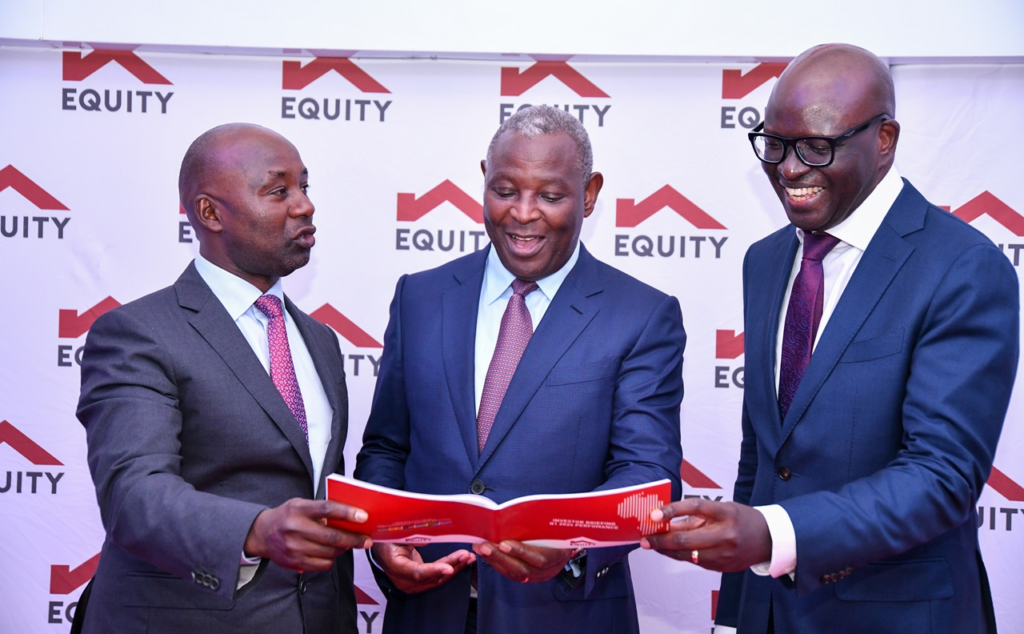Equity Group holdings, which is the region’s most valuable brand according to Brand Finance, has reported a 25% rise in profit after tax, hitting Sh16 billion in the first quarter (Q1) of 2024 that ended March 31, 2024.
The group’s managing director and chief executive, Dr James Mwangi said the profit is attributable, in part, to a strong leadership and an agile balance sheet. The lender adopted a judicious approach to deposit placements, curbing growth to 11% as compared to 29% registered for the year ended December 31, 2023, a move that allowed the bank to avoid expensive deposits.
Simultaneously, long-term borrowed funds declined by 21% in the first quarter as the group repaid maturing, and costly dollar-denominated loans.
The lender has also navigated the elevated credit risk environment while maintaining a healthy loan-to-deposit ratio of 63% as at March 31, 2024 as compared to 65.3% as at December 31, 2023. The bank’s loan book recorded a modest 3% on year-to-year growth as at Martch 31, 2024 as compared to 26% growth rate for the year ended December 31, 2023, reflecting a cautious approach to credit underwriting amidst heightened non-performing loan (NPL) levels.
In 2024, the bank has shifted from lending to the private sector to the public sector through government securities, thus its cost of credit has declined to 2.9% for the quarter, down from 4.4% in the previous year, while NPL coverage improved to 68.5% in the quarter as compared to 67.3% reported on December 31, 2023. There was slow customer deposits growth and decline in long-term loans yielding a lower year on year growth of interest expense for the period to March 31, 2024 to 41% compared to 53% for the year ended 31st December 2023.
Interest income for the period to March 31, 2024 also witnessed growth to 33% compared to 30% for the year ended December 31, 2023. Growth of net interest income accelerated to 28% for the period ended March 31, 2024 compared to 21% for the year ended December 31, 2023.
“A strong risk management framework for a strong trusted brand, strong capital, liquidity, and asset quality buffers have helped leadership and management in being bold and decisive,” Dr Mwangi said.
He noted that the group’s liquidity stood at 52.1% with a balance sheet of Sh1.69 trillion which was nearly split equally between a loan book of Sh779 billion and liquid assets of Sh752 billion split between cash and cash equivalent of Sh279 billion and investment in government securities of Sh473 billion.
Additionally, the lender’s loan book is distributed with; 40% to corporates and large enterprises, 26% to micro, small, and medium enterprises (MSMEs), 28% to retail and consumer segments, and 6% to public service institutions, allowing the group to maintain a well-balanced risk profile, cushioning the impact of sector-specific shocks and ensuring long-term sustainability.
The group’s subsidiaries in the six countries in the region, particularly the Democratic Republic of Congo (DRC) and Rwanda, contributed 63% of the Sh20.4 billion profit before tax with a return on average equity of 27.6%, cementing Equity’s position as the regional banking leader. In DRC, the group has managed to double its net profit to Sh12.1 billion while in Rwanda, the group has started to see an improvement as the subsidiary’s contribution has risen to Sh4.2 billion.
Diversification into the insurance sector, too, has been noteworthy, with its new life insurance business taking a strong start with robust growth in its second year of operation. The insurance subsidiary recorded a 106% surge in profit after tax to Sh321 million. Also, total insurance assets grew by an impressive 288%, closing at Sh20.8 billion while return on average equity increased from 43% to 54%.


